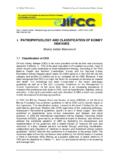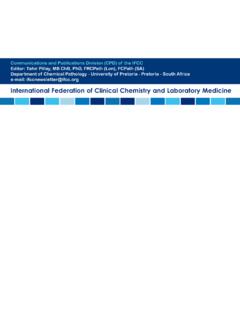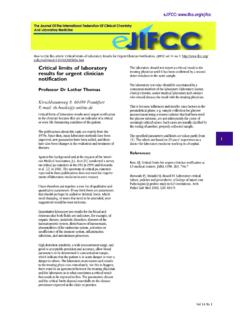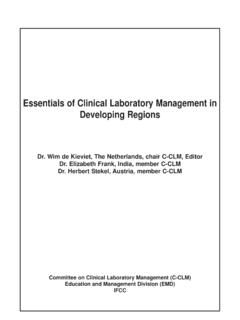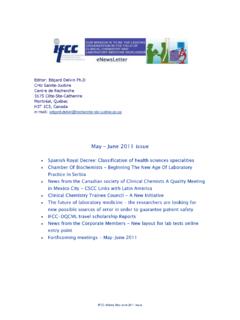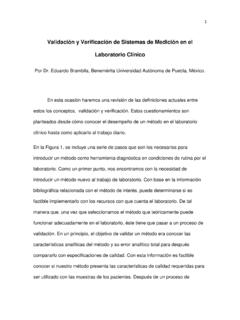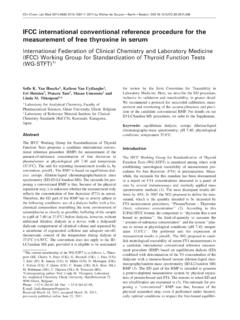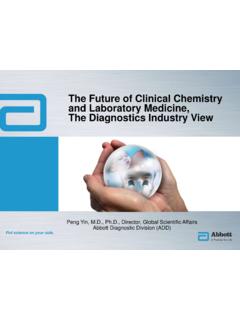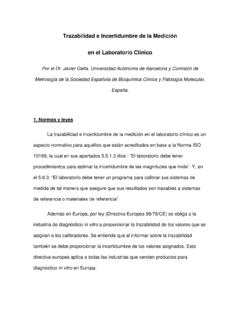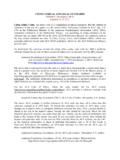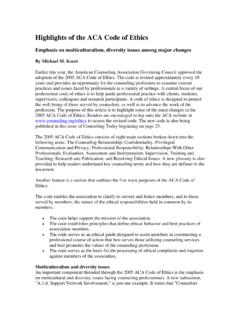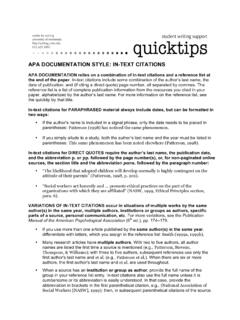Transcription of Ethics in Clinical Laboratory Practice - IFCC
1 07-11-2017 1 Ethics in Clinical Laboratory Practice Praveen Sharma Satellite Educational Workshop on Intelligent Clinical Laboratory Management: Impacts on Quality System Improvement Hilton Durban - October 22, 2017 IFCC Committee on Clinical Laboratory Management - md-committees/c-clm/ 1 Presentation Outline Evolution of Bioethics Ethical guidelines in Belmont report Ethical issues in Laboratory Ethical issues in pre-analytical phase Ethical issues in analytical phase Ethical issues in post-analytical phase Ethical issues in ISO 15189 PRAVEEN SHARMA/ Ethics IN Clinical Laboratory Practice 2 07-11-2017 2 PRAVEEN SHARMA/ Ethics IN Clinical Laboratory Practice 3 Question What s your opinion about Ethics in Clinical Laboratory Practice ?
2 PRAVEEN SHARMA/ Ethics IN Clinical Laboratory Practice 4 07-11-2017 3 PRAVEEN SHARMA/ Ethics IN Clinical Laboratory Practice 5 Nuremberg code (1947) Declaration of Geneva (1948) Evolution of Bioethics PRAVEEN SHARMA/ Ethics IN Clinical Laboratory Practice 6 Evolution of Bioethics Declaration of Helsinki (1964) Belmont Report (1978) 07-11-2017 4 PRAVEEN SHARMA/ Ethics IN Clinical Laboratory Practice 7 Evolution of Bioethics Declaration of Geneva and the Belmont report are also applicable to the Practice of Clinical medicine. The Belmont Report is one of the key works concerning Ethics and healthcare research Created in 1978 by the National Commission for the Protection of Human Subjects of Biomedical and Behavioural Research.
3 Outlines ethical principles and guidelines for the protection of human subjects. PRAVEEN SHARMA/ Ethics IN Clinical Laboratory Practice 8 Ethical guidelines in Belmont Report Respect for persons Acknowledgement of autonomy and protection of those with diminished autonomy. Beneficence The duty to act in the best interests of patients or research subjects. The goal of maximizing benefits and minimizing harm. Also called non-maleficence. Justice The duty or obligation to treat patients equally and to distribute, by allocating fairly, what is rightly due in terms of benefits, risks and cost. 07-11-2017 5 PRAVEEN SHARMA/ Ethics IN Clinical Laboratory Practice 9 Does Laboratory need Ethics ? PRAVEEN SHARMA/ Ethics IN Clinical Laboratory Practice 10 Ethical Considerations in AACC 07-11-2017 6 PRAVEEN SHARMA/ Ethics IN Clinical Laboratory Practice 11 Ethical Considerations in AACC 1.
4 Uphold standards of professionalism, be honest in all professional endeavours, and maintain a high level of personal integrity. 2. Avoid scientific and professional misconduct including, but not limited to fraud, fabrication, plagiarism, concealment, inappropriate omission of information, and making false or deceptive statements. 3. Report any health care professional who engages in fraud or deception or whose deficiency in character or competence jeopardizes patient care or other personnel. PRAVEEN SHARMA/ Ethics IN Clinical Laboratory Practice 12 Ethical Considerations in AACC 4. Maintain a high level of quality in the product(s) of professional endeavours, including validity and reliability of test results, interpretive opinions, publications, and scientific research.
5 5. Respect the privacy and confidentiality of protected health information encountered during the course of my professional activities in accordance with legal and ethical obligations. 6. Continuously strive to augment the professional qualifications, knowledge, and skills, and present them accurately. 07-11-2017 7 PRAVEEN SHARMA/ Ethics IN Clinical Laboratory Practice 13 Ethical Considerations in AACC 7. Promote the safety and welfare of patients, employees, co-workers, colleagues, the public, and the environment. 8. Avoid, or promptly disclose and work to resolve, actual or potential conflicts of interest. 9. Encourage open and honest discussion among physicians, other healthcare providers and/or facility managers regarding disclosure to patients of information about medical errors.
6 PRAVEEN SHARMA/ Ethics IN Clinical Laboratory Practice 14 Ethical Considerations in AACC 10. Comply with relevant laws and seek to change them when they are contrary to the best interests of the patient. 07-11-2017 8 PRAVEEN SHARMA/ Ethics IN Clinical Laboratory Practice 15 Ethical Issues in Laboratory PRAVEEN SHARMA/ Ethics IN Clinical Laboratory Practice 16 Ethical Issues in Pre-analytical Phase 07-11-2017 9 PRAVEEN SHARMA/ Ethics IN Clinical Laboratory Practice 17 Ethical Issues in Pre-analytical Phase The maintenance of ethical standards in the pre-analytical phase is the collaborative responsibility of the Laboratory , the health care provider, researcher, phlebotomist, nurse, or whoever collects the specimen. PRAVEEN SHARMA/ Ethics IN Clinical Laboratory Practice 18 Ethical Issues in Pre-analytical Phase Their roles include : Proper identification of the patient or subject.
7 Collection of the appropriate sample using the appropriate technique. Appropriate identification and labelling of the sample so that the right tests are performed. Appropriate handling of the specimen until testing is performed. 07-11-2017 10 PRAVEEN SHARMA/ Ethics IN Clinical Laboratory Practice 19 Ethical Issues in Pre-analytical Phase Applying the three principles PRAVEEN SHARMA/ Ethics IN Clinical Laboratory Practice 20 Ethical Issues in Pre-analytical Phase Consent Consent should be informed and may be either expressed or implied. Expressed - Subject is asked for written or verbal agreement. Implied - When a patient provides a requisition and willingly sits in a collection chair and allows a sample to be taken Informed consent may pose an ethical problem if the patient is incompetent to make a decision due to age, mental status, or critical illness.
8 07-11-2017 11 PRAVEEN SHARMA/ Ethics IN Clinical Laboratory Practice 21 Ethical Issues in Pre-analytical Phase The patient s right to refuse to be tested should be respected. In special cases, healthcare professionals have an obligation to consult the guidelines provided by the institution in which they Practice , and they must weigh the risks of loss of a patient s autonomy versus the benefits of the testing Confidential information about patient demographics, and other test details should be given only to appropriate personnel. Confidentiality must be maintained at every step of the process including specimen transportation and data entry PRAVEEN SHARMA/ Ethics IN Clinical Laboratory Practice 22 Ethical Issues in Pre-analytical Phase All tests should benefit the patient based on the best medical evidence.
9 Standard operating procedures and trained personnel should be in place to prevent any adverse events in the collection procedure. The collection procedure should be carried out using universal precautions to protect the patient and the healthcare worker, and should be performed by properly trained personnel. 07-11-2017 12 PRAVEEN SHARMA/ Ethics IN Clinical Laboratory Practice 23 Ethical Issues in Pre-analytical Phase Additional specimens shall not be collected for research procedures without informed consent from the patient and approval from the appropriate Ethics board. Specimens should be labelled with at least 2 unique identifiers, and all aliquot tubes should be similarly identified. Samples should be transported in a manner to preserve the integrity of the sample.
10 PRAVEEN SHARMA/ Ethics IN Clinical Laboratory Practice 24 Ethical Issues in Pre-analytical Phase Providing access to a wide variety of Laboratory tests at reasonable cost. Evaluating the need to introduce new tests and the opportunities to discontinue older tests when better tests are available. No preference given to individuals to facilitate or expedite the collection process at the expense of other patients. 07-11-2017 13 PRAVEEN SHARMA/ Ethics IN Clinical Laboratory Practice 25 Ethical Issues in Analytical Phase PRAVEEN SHARMA/ Ethics IN Clinical Laboratory Practice 26 Ethical Issues in Analytical Phase Confidentiality, quality and competence are vital for all laboratories and settings 07-11-2017 14 PRAVEEN SHARMA/ Ethics IN Clinical Laboratory Practice 27 Ethical Issues in Analytical Phase Confidentiality during the analytical phase may be almost a by-product of automation in a Laboratory Challenges of maintaining confidentiality during the analytical phase are often greater in small laboratories that perform manual testing PRAVEEN SHARMA/ Ethics IN Clinical Laboratory Practice 28 Ethical Issues in Analytical Phase Applying the three principles 07-11-2017 15 PRAVEEN SHARMA/ Ethics IN Clinical Laboratory Practice 29 Ethical Issues in Analytical Phase Patient have the right to decline to have their specimens analyzed even after the specimens
